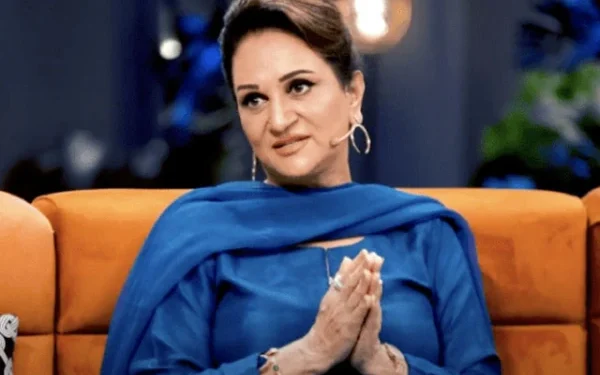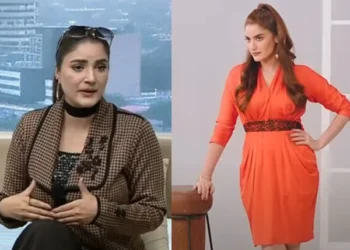Veteran Pakistani actress and social activist Bushra Ansari has raised her voice once again on a pressing social issue that has shocked the nation. Following the tragic death of a child in Swat, allegedly due to physical abuse by a madrasa teacher, the award-winning actress has urged for strict registration, oversight, and accountability of religious seminaries (madrasas) across Pakistan. She also called upon parents to be more compassionate, vigilant, and involved in their children’s lives.
Renowned for her fearless commentary on socio-political issues, Bushra Ansari has used her platform to highlight a disturbing trend of violence in some madrasas, where children are subjected to physical and psychological abuse under the guise of religious education. Her powerful statement, shared widely on social media, is not just a reaction to a single incident—it is a broader critique of systemic negligence, unregulated religious instruction, and parental apathy.
The Incident That Sparked the Outcry
The unfortunate incident in Swat, where a young child reportedly lost his life after being physically abused by a madrasa teacher, has reignited public debate over the safety and accountability of religious schools in Pakistan. Though investigations are ongoing, preliminary reports indicate that corporal punishment played a significant role in the child’s death, raising serious questions about how such institutions are allowed to operate without formal oversight.
This tragedy has sparked a wave of public anger, sorrow, and demands for justice—not only for the victim but for the thousands of children enrolled in similar institutions across the country.
Bushra Ansari’s Statement: A Call for Institutional Reform
Speaking out on her social media platforms, Bushra Ansari expressed deep sorrow and outrage at the incident. Her message was both emotional and urgent, targeting multiple layers of accountability, including:
- The state and government authorities
- Madrasa teachers and administration
- Parents and guardians of the children
She emphasized that madrasas must be registered and regulated by the state and insisted that the time for complacency is over.
“It has been seen that some inexperienced teachers in madrasas want to teach children by frightening them. This is not just wrong—it’s un-Islamic. Islam teaches love, mercy, and compassion, not fear and abuse,” she stated.
The Need for Regulation: Why Madrasa Oversight Is Essential
Pakistan is home to more than 35,000 registered madrasas—and potentially thousands more that are unregistered or informally run. While many of these institutions provide valuable religious education and even shelter to underprivileged children, a lack of regulatory oversight has allowed some to operate with little to no accountability.
Key Issues in the Madrasa System:
- Unqualified or underqualified teachers
- Use of corporal punishment as a disciplinary method
- Absence of mental health support and counseling
- Outdated or non-standardized curriculum
- Inadequate background checks on staff
- No formal child protection mechanisms
Bushra Ansari highlighted these concerns and demanded that government agencies, such as the Ministry of Education, the Ministry of Religious Affairs, and provincial departments, implement a nationwide monitoring framework to ensure the safety and well-being of children in religious institutions.
“Fear Is Not a Teaching Tool”: The Psychological Impact on Children
In her statement, Bushra pointed out that fear-based teaching methods, such as threats, physical punishment, and humiliation, have lasting negative impacts on children. These methods are not only ineffective for learning but also deeply traumatic.
Psychological Effects of Abuse in Educational Settings:
- Anxiety and depression
- Low self-esteem
- Social withdrawal
- Learning disabilities or fear of education
- Post-Traumatic Stress Disorder (PTSD)
She reiterated that Islamic teachings strongly condemn violence against children. Prophet Muhammad (PBUH) was known for his kindness toward children and never advocated for violence as a means of education.
“How can we justify hurting a child in the name of religion? Are we here to guide them or destroy their innocence and trust?” Bushra asked.
Parents Share the Responsibility: A Call for Compassion and Vigilance
While much of the focus has been on madrasas and their administration, Bushra Ansari made a critical point that parents are equally responsible for what happens to their children.
“If your child tells you they don’t want to go somewhere—especially a madrasa—don’t dismiss them. Ask why. Listen to them. Talk to them. Don’t turn your back,” she said.
She appealed to parents to:
- Spend time with their children
- Create an environment where children feel safe to speak up
- Investigate red flags such as changes in behavior or physical injuries
- Avoid blind trust in institutions or teachers without verifying the safety and integrity of those involved
By calling for empathy, Bushra underlined the importance of emotional intelligence in parenting, particularly in conservative societies where children’s voices are often silenced.
Reactions from the Public and Civil Society
Bushra Ansari’s comments have gone viral, triggering a nationwide conversation. Many activists, educators, and celebrities echoed her sentiments, praising her for breaking the silence on a taboo issue.
Public Support Highlights:
- “Bushra Ansari is right. Regulation is not optional—it’s essential.”
- “Too many children have suffered in silence. We need change.”
- “Our religious schools must uphold the values of Islam, not contradict them.”
Some have even started online petitions demanding mandatory teacher training, installation of CCTV cameras in classrooms, and helplines for children to report abuse.
Government and Religious Institutions: The Path Forward
Following public outrage, local authorities in Swat have vowed to carry out a full investigation into the incident. However, systemic change will require more than just reactive measures.
Key Recommendations for Reform:
- Mandatory Registration of All Madrasas: No institution should operate without government approval.
- Teacher Training & Certification: Teachers should be trained in child psychology, non-violent discipline, and Islamic ethics.
- Child Protection Committees: Every madrasa should have a designated safeguarding officer.
- Routine Monitoring and Inspections: Government agencies should conduct regular audits and surprise inspections.
- Helplines and Counseling Services: A confidential system where children can report abuse without fear.
- Parental Awareness Campaigns: Educating parents about the warning signs of abuse and how to respond.
Bushra Ansari: A Voice for the Voiceless
Bushra Ansari is not just a legendary actress with decades of contributions to Pakistani television, film, and theater—she is also a fearless advocate for social justice. Whether it’s issues of child rights, women’s empowerment, or education reform, she continues to use her influence for meaningful change.
Her call for monitoring madrasas and parental accountability goes beyond a single incident. It is a demand for systemic reform that protects the most vulnerable members of society—our children.
Conclusion: Will We Listen This Time?
The death of a child due to alleged abuse in a madrasa is not just a tragic news headline—it is a reflection of deeper structural issues within our education and religious institutions. Bushra Ansari’s powerful statement reminds us that we can no longer afford to look away.
If change is to come, it will require collective responsibility—from the state, religious leaders, educators, and parents. Silence and inaction are no longer acceptable. The question remains: How many more lives will it take before we act?

























